

SUBSCRIBE TO OUR FREE NEWSLETTER
Daily news & progressive opinion—funded by the people, not the corporations—delivered straight to your inbox.
5
#000000
#FFFFFF
To donate by check, phone, or other method, see our More Ways to Give page.


Daily news & progressive opinion—funded by the people, not the corporations—delivered straight to your inbox.
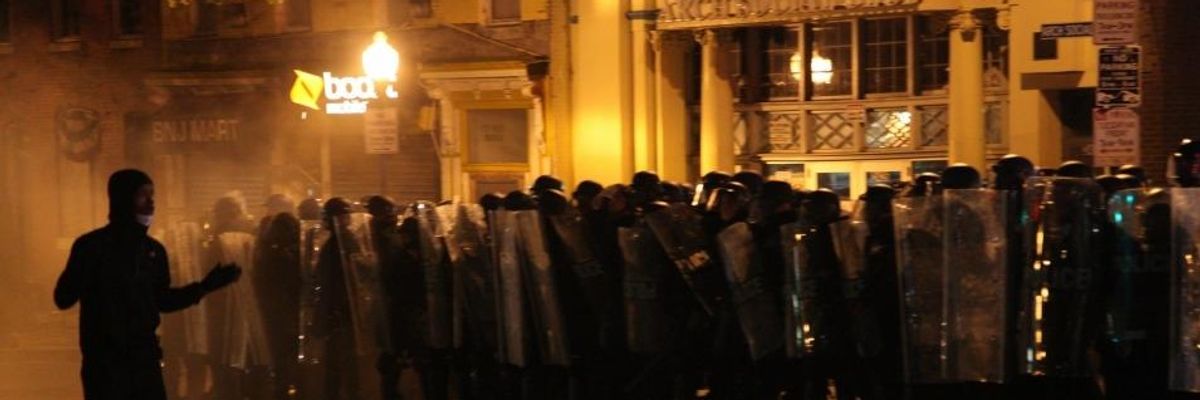
A Baltimore protester faces a wall of police in riot gear during a demonstration on April 28, 2015. (Photo: Arash Azizzada/cc/flickr)
The United States Department of Justice announced Friday that after weeks of uproar and protest it would open an official investigation into the Baltimore Police Department to determine whether the discrimination and events that led to the brutal death of Freddie Gray were part of systemic pattern of abuse.
After traveling to the city this week, the newly anointed U.S. Attorney General Loretta Lynch said that recent events, including the "tragic in-custody death of Freddie Gray," had led to a "serious erosion of public trust," prompting local officials and community leaders to seek federal oversight of policing practices.
The investigation, Lynch continued, will determine "whether the Baltimore Police Department has engaged in a pattern or practice of violations" of the U.S. Constitution or the community's civil rights, focusing specifically on "allegations that Baltimore Police Department officers use excessive force, including deadly force; conduct unlawful searches, seizures and arrests; and engage in discriminatory policing."
On Tuesday, Baltimore Mayor Stephanie Rawlings-Blake, who requested the probe, also said the DOJ will investigate whether the department has "engaged in a pattern of stops, searches, or arrests that violate the Fourth Amendment."
The patterns or practice investigation will occur in addition to a federal probe announced April 21, which is examining whether civil rights laws were violated specifically during Gray's arrest.
"A just resolution in Baltimore will address not only the city's long history of police violence, but also the economic privation and state control that helped spur such strong resistance by its residents."
--Sharlyn Grace and Oren Nimni, National Lawyer's Guild
The city is already undergoing a voluntary investigation with the DOJ into alleged police brutality, which began six months prior to Gray's death.
The announcement comes a week after Maryland State Attorney Marilyn Mosby said the state would be filing criminal charges against the officers involved in Gray's death.
Though welcoming the news, civil rights advocates question whether either prosecution of the officers or a federal investigation can go far enough to address the root causes of police violence against people of color.
In an op-ed on Friday, attorneys Sharlyn Grace, National Lawyer's Guild (NLG) national vice-president, and Oren Nimni, chair of the NLG United People of Color Caucus (TUPOCC), wrote about the need to address the "deeply entrenched conditions and systems" that led to the deaths of Gray and others killed by police.
"The problem is not just these six cops. The problem is also not just the Baltimore Police Department (although they are notorious)," write Grace and Nimni.
They continue:
While the police continue to enforce conditions of poverty, there will be violence. While the police continue to degrade and dehumanize women, trans* and gender non-conforming people, there will be violence. While the police occupy communities of color, there will be violence. When we seek an end to police violence, we seek, in part, an end to police.
A just resolution can only come from addressing systemic issues in policing and real attempts to meet the needs of the community at large, things that prosecution is not designed to handle. A just resolution in Baltimore will address not only the city's long history of police violence, but also the economic privation and state control that helped spur such strong resistance by its residents.
Trump and Musk are on an unconstitutional rampage, aiming for virtually every corner of the federal government. These two right-wing billionaires are targeting nurses, scientists, teachers, daycare providers, judges, veterans, air traffic controllers, and nuclear safety inspectors. No one is safe. The food stamps program, Social Security, Medicare, and Medicaid are next. It’s an unprecedented disaster and a five-alarm fire, but there will be a reckoning. The people did not vote for this. The American people do not want this dystopian hellscape that hides behind claims of “efficiency.” Still, in reality, it is all a giveaway to corporate interests and the libertarian dreams of far-right oligarchs like Musk. Common Dreams is playing a vital role by reporting day and night on this orgy of corruption and greed, as well as what everyday people can do to organize and fight back. As a people-powered nonprofit news outlet, we cover issues the corporate media never will, but we can only continue with our readers’ support. |
The United States Department of Justice announced Friday that after weeks of uproar and protest it would open an official investigation into the Baltimore Police Department to determine whether the discrimination and events that led to the brutal death of Freddie Gray were part of systemic pattern of abuse.
After traveling to the city this week, the newly anointed U.S. Attorney General Loretta Lynch said that recent events, including the "tragic in-custody death of Freddie Gray," had led to a "serious erosion of public trust," prompting local officials and community leaders to seek federal oversight of policing practices.
The investigation, Lynch continued, will determine "whether the Baltimore Police Department has engaged in a pattern or practice of violations" of the U.S. Constitution or the community's civil rights, focusing specifically on "allegations that Baltimore Police Department officers use excessive force, including deadly force; conduct unlawful searches, seizures and arrests; and engage in discriminatory policing."
On Tuesday, Baltimore Mayor Stephanie Rawlings-Blake, who requested the probe, also said the DOJ will investigate whether the department has "engaged in a pattern of stops, searches, or arrests that violate the Fourth Amendment."
The patterns or practice investigation will occur in addition to a federal probe announced April 21, which is examining whether civil rights laws were violated specifically during Gray's arrest.
"A just resolution in Baltimore will address not only the city's long history of police violence, but also the economic privation and state control that helped spur such strong resistance by its residents."
--Sharlyn Grace and Oren Nimni, National Lawyer's Guild
The city is already undergoing a voluntary investigation with the DOJ into alleged police brutality, which began six months prior to Gray's death.
The announcement comes a week after Maryland State Attorney Marilyn Mosby said the state would be filing criminal charges against the officers involved in Gray's death.
Though welcoming the news, civil rights advocates question whether either prosecution of the officers or a federal investigation can go far enough to address the root causes of police violence against people of color.
In an op-ed on Friday, attorneys Sharlyn Grace, National Lawyer's Guild (NLG) national vice-president, and Oren Nimni, chair of the NLG United People of Color Caucus (TUPOCC), wrote about the need to address the "deeply entrenched conditions and systems" that led to the deaths of Gray and others killed by police.
"The problem is not just these six cops. The problem is also not just the Baltimore Police Department (although they are notorious)," write Grace and Nimni.
They continue:
While the police continue to enforce conditions of poverty, there will be violence. While the police continue to degrade and dehumanize women, trans* and gender non-conforming people, there will be violence. While the police occupy communities of color, there will be violence. When we seek an end to police violence, we seek, in part, an end to police.
A just resolution can only come from addressing systemic issues in policing and real attempts to meet the needs of the community at large, things that prosecution is not designed to handle. A just resolution in Baltimore will address not only the city's long history of police violence, but also the economic privation and state control that helped spur such strong resistance by its residents.
The United States Department of Justice announced Friday that after weeks of uproar and protest it would open an official investigation into the Baltimore Police Department to determine whether the discrimination and events that led to the brutal death of Freddie Gray were part of systemic pattern of abuse.
After traveling to the city this week, the newly anointed U.S. Attorney General Loretta Lynch said that recent events, including the "tragic in-custody death of Freddie Gray," had led to a "serious erosion of public trust," prompting local officials and community leaders to seek federal oversight of policing practices.
The investigation, Lynch continued, will determine "whether the Baltimore Police Department has engaged in a pattern or practice of violations" of the U.S. Constitution or the community's civil rights, focusing specifically on "allegations that Baltimore Police Department officers use excessive force, including deadly force; conduct unlawful searches, seizures and arrests; and engage in discriminatory policing."
On Tuesday, Baltimore Mayor Stephanie Rawlings-Blake, who requested the probe, also said the DOJ will investigate whether the department has "engaged in a pattern of stops, searches, or arrests that violate the Fourth Amendment."
The patterns or practice investigation will occur in addition to a federal probe announced April 21, which is examining whether civil rights laws were violated specifically during Gray's arrest.
"A just resolution in Baltimore will address not only the city's long history of police violence, but also the economic privation and state control that helped spur such strong resistance by its residents."
--Sharlyn Grace and Oren Nimni, National Lawyer's Guild
The city is already undergoing a voluntary investigation with the DOJ into alleged police brutality, which began six months prior to Gray's death.
The announcement comes a week after Maryland State Attorney Marilyn Mosby said the state would be filing criminal charges against the officers involved in Gray's death.
Though welcoming the news, civil rights advocates question whether either prosecution of the officers or a federal investigation can go far enough to address the root causes of police violence against people of color.
In an op-ed on Friday, attorneys Sharlyn Grace, National Lawyer's Guild (NLG) national vice-president, and Oren Nimni, chair of the NLG United People of Color Caucus (TUPOCC), wrote about the need to address the "deeply entrenched conditions and systems" that led to the deaths of Gray and others killed by police.
"The problem is not just these six cops. The problem is also not just the Baltimore Police Department (although they are notorious)," write Grace and Nimni.
They continue:
While the police continue to enforce conditions of poverty, there will be violence. While the police continue to degrade and dehumanize women, trans* and gender non-conforming people, there will be violence. While the police occupy communities of color, there will be violence. When we seek an end to police violence, we seek, in part, an end to police.
A just resolution can only come from addressing systemic issues in policing and real attempts to meet the needs of the community at large, things that prosecution is not designed to handle. A just resolution in Baltimore will address not only the city's long history of police violence, but also the economic privation and state control that helped spur such strong resistance by its residents.
"Imagine if federal worker unions and Democratic Party officials showed up at the plant gate of a company that was about to close its doors," said one labor advocate recently. "Why aren't the Democrats doing this?"
Congressman Ro Khanna is raising the alarm over mass layoffs in the U.S. economy resulting from the failed economic policies of President Donald Trump, including over 4,000 factory workers who lost their jobs this week due to firings or plant closures.
On Thursday, automaker Stellantis, citing conditions created by Trump's tariffs, announced temporary layoffs for 900 workers, represented by the United Auto Workers (UAW). "The affected U.S. employees," reported CNN, "work at five different Midwest plants: the Warren Stamping and Sterling Stamping plants in Michigan, as well as the Indiana Transmission Plant, Kokomo Transmission Plant and Kokomo Casting Plant, all in Kokomo, Indiana."
In a social media thread on Saturday night, Rep. Ro Khanna (D-Calif.)—a lawmaker who has advocating loudly, including in books and in Congress, for an industrialization policy that would bring manufacturing jobs back to the United States—posted a litany of other layoffs announced recently as part of the economic devastation and chaos unleashed by Trump as well as conditions that reveal how vulnerable U.S. workers remain.
"This week," Khann wrote, "19 factories had mass layoffs, 15 closed, and 4,134 factory workers across America lost their jobs. Cleveland-Cliffs laid off 1,200 workers in Michigan and Minnesota as they deal with the impact of Trump's tariffs on steel and auto imports."
"We need jobs and currently at this time, the majority of the companies that we work with and represent our members at are not hiring." —Mark DePaoli, UAW
For union leaders representing those workers at Cleveland-Cliffs, they said "chaos" was the operative word. "Chaos. You, know? A lot of questions. You've got a lot of people who worked there a long time that are potentially losing their job," Bill Wilhelm, a servicing representative and editor with UAW Local 600, told local ABC News affiliate WXYZ-Channel 7.
The United Auto Workers says the layoff fund set aside for those losing their jobs won't last long and find them new jobs of that quality will not be easy. "Our first concern will be to look around at all the companies where we have members and see if we can find jobs," said the local's 1st vice president Mark DePaoli. "I mean, jobs are going to be the key. We need jobs and currently at this time, the majority of the companies that we work with and represent our members at are not hiring."
The pain of workers in families in Dearborn, as indicated by Khanna's thread, is just the tip of the iceberg. In post after post, he cataloged a stream of new layoffs impacting workers nationwide and across various sectors:
With public sector workers being fired in massive numbers nationwide due to the blitzkrieg unleashed by the Elon Musk-led Department of Government Efficiency, or DOGE, private sector workers are no stranger to mass layoffs within a U.S. economy dominated by corporate interests and union density still at historic lows.
Les Leopold, executive director of the Labor Institute who has been sounding the alarm for years about the devastation associated with mass layoffs, wrote recently about how the situation is even worse than he previously understood. On top of existing corporate greed and the stock buyback phenomena driving many of the mass layoffs in the private sector, Trump's mismanagement of tariff and trade policy is almost certain to make things worse, triggering more job losses in addition to higher costs on consumer goods.
In order to combat Trump, Leopold wrote last month, "Democrats should take a page from Trump and put job protection on the top of their agenda. As tariffs bite and cause job destruction, the Democrats should show up and support those laid-off workers."
Instead of simply calling Trump's tariffs "insane," which many rightly have, the Democrats "should call them job-killing tariffs," advised Leopold. "As prices rise, they can blame Trump for that as well."
With Trump's economic policies coming into fuller view this, the picture is bleak for businesses large and small—and that means more pain for workers.
As Axios' Ben Berkowitz reported Saturday. "When everything gets more expensive everywhere because of tariffs, that starts a cycle for businesses, too — one that might end with layoffs, bankruptcies, and higher prices for the survivors' customers," he explained. "The cycle is just starting now, but the pain is immediate."
The "big picture," Berkowitz continued, is this:
The stock market is not the economy, but if you want a decent proxy for Main Street businesses, look at the Russell 2000, a broad measure of the stock market's small companies across industries.
—It's down almost 20% this year alone.
—That in and of itself doesn't make a business turn the lights off, but it says something about public confidence in their prospects.
—"The market is like a real time poll ... this is going to impact all businesses in one way or another undoubtedly," Ken Mahoney of Mahoney Asset Management wrote Friday.
On the question of silence and who will stand up for American workers—whether in the public or private sector—it's not clear who will emerge as their true defender.
"Imagine if federal worker unions and Democratic Party officials showed up at the plant gate of a company that was about to close its doors to finance hefty stock buybacks for its billionaire owners," Leopold wrote in early March. "A show of support for their fellow layoff victims and a unity message aimed at stopping billionaire job destruction would be simple to craft and easy to share. It would be news."
"Why aren't the Democrats doing this?" he asked.
"Thank you to the hundreds of thousands of Americans across the country who are standing up and speaking out for our voting rights, fundamental freedoms, and essential services like Social Security and Medicare."
In communities large and small across the United States on Saturday, hundreds of thousands of people collectively took to the streets to make their opposition to President Donald Trump heard.
The people who took part in the organized protests ranged from very young children to the elderly and their message was scrawled on signs of all sizes and colors—many of them angry, some of them funny, but all in line with the "Hands Off" message that brought them together.
"Thank you to the hundreds of thousands of Americans across the country who are standing up and speaking out for our voting rights, fundamental freedoms, and essential services like Social Security and Medicare," said the group Stand Up America as word of the turnout poured in from across the country.
A relatively small, but representative sample of photographs from various demonstrations that took place follows.
Demonstrators gather on Boston Common, cheering and chanting slogans, during the nationwide "Hands Off!" protest against US President Donald Trump and his advisor, Tesla CEO Elon Musk, in Boston, Massachusetts on April 5, 2025. (Photo by Joseph Prezioso / AFP)
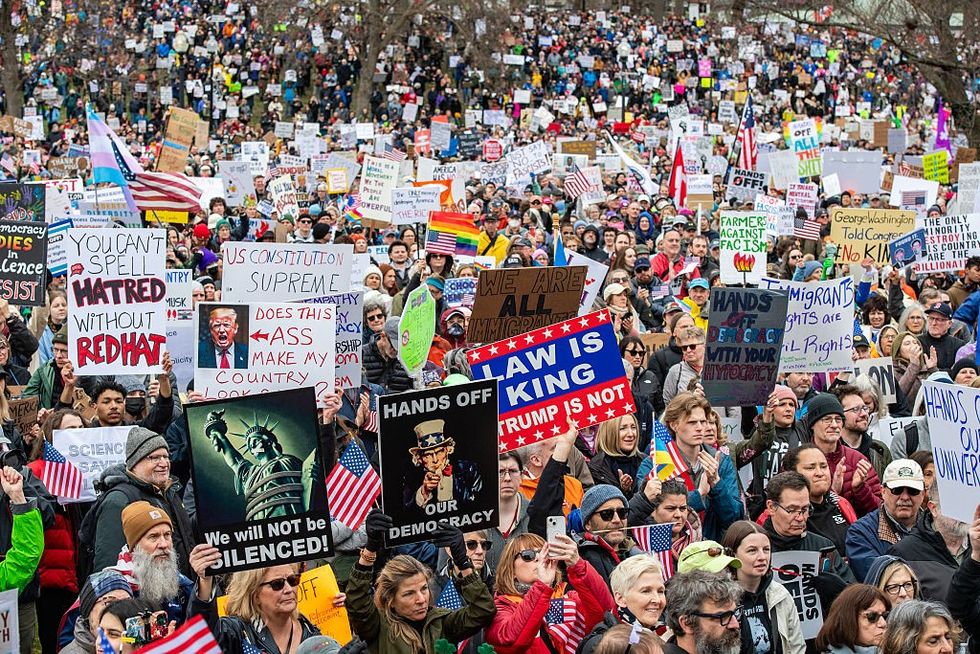
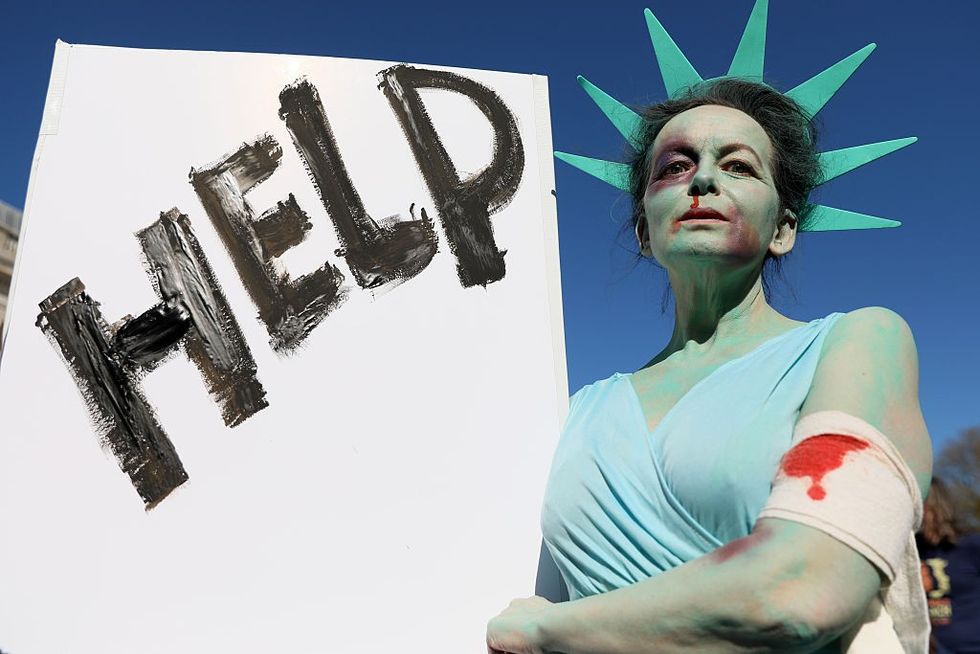
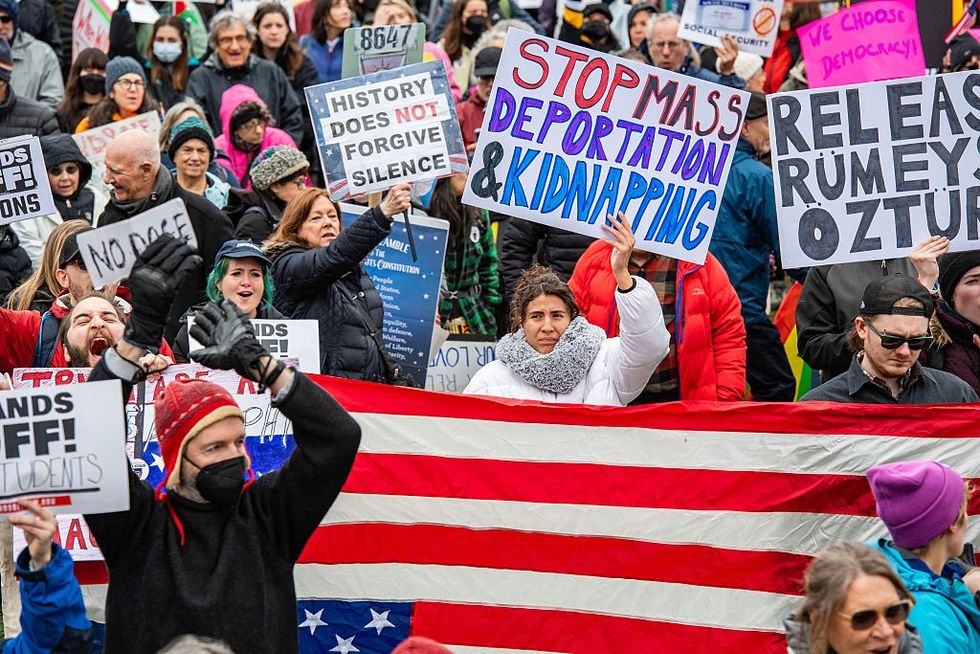
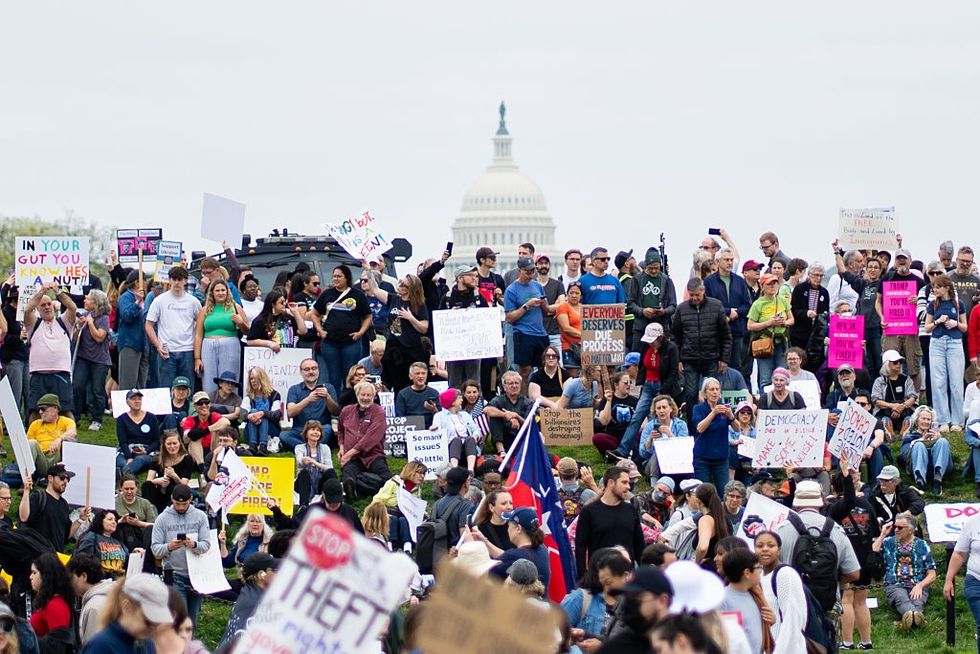
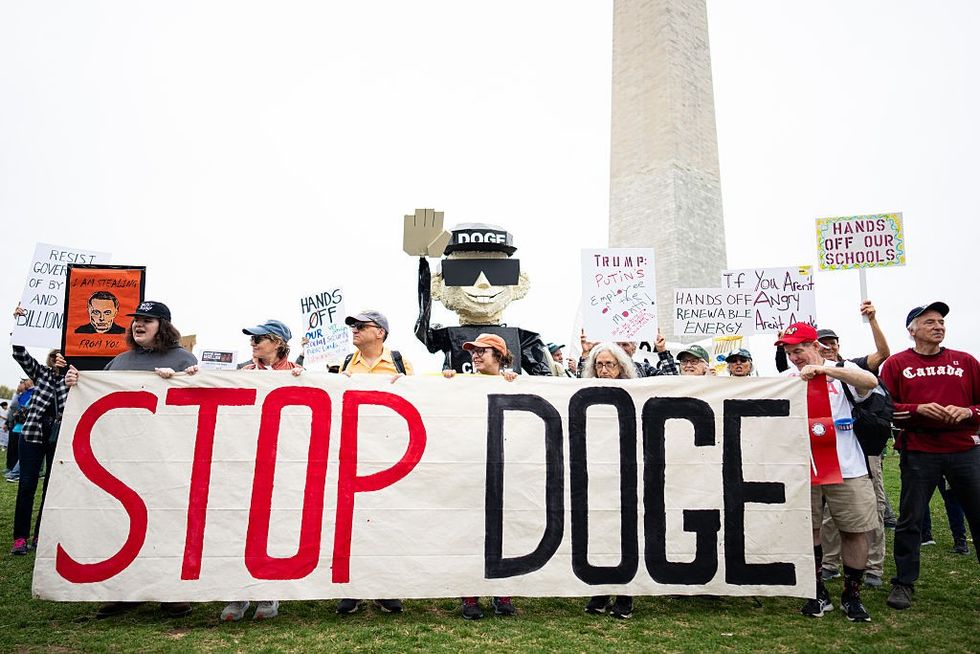
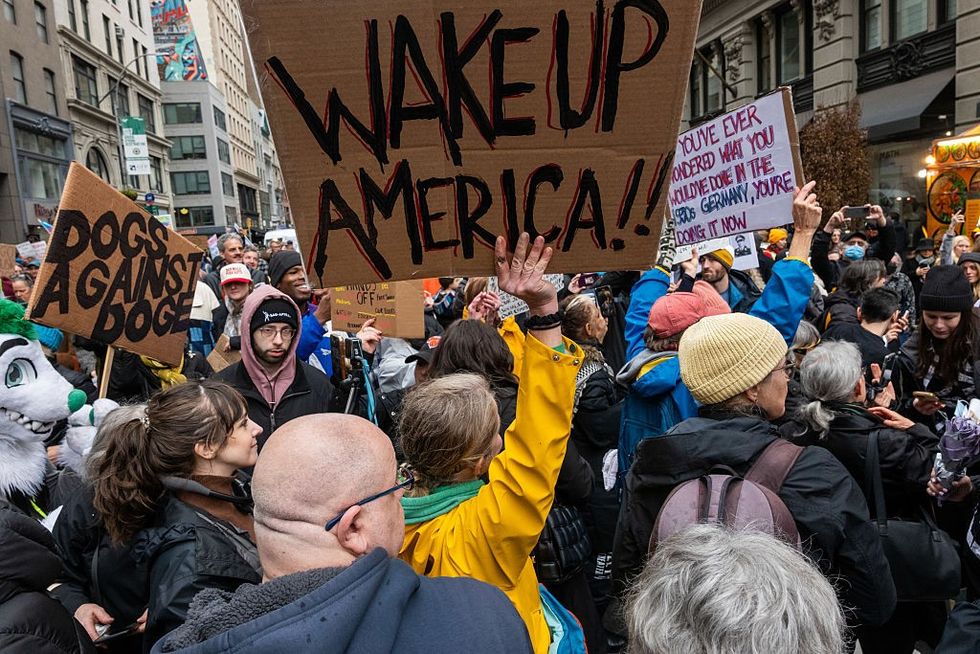
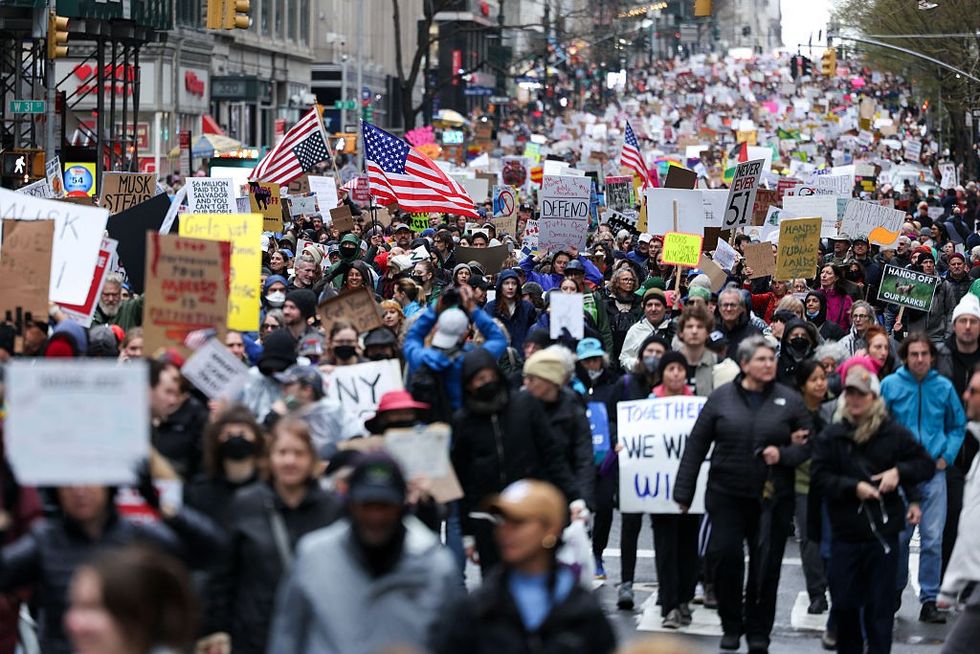
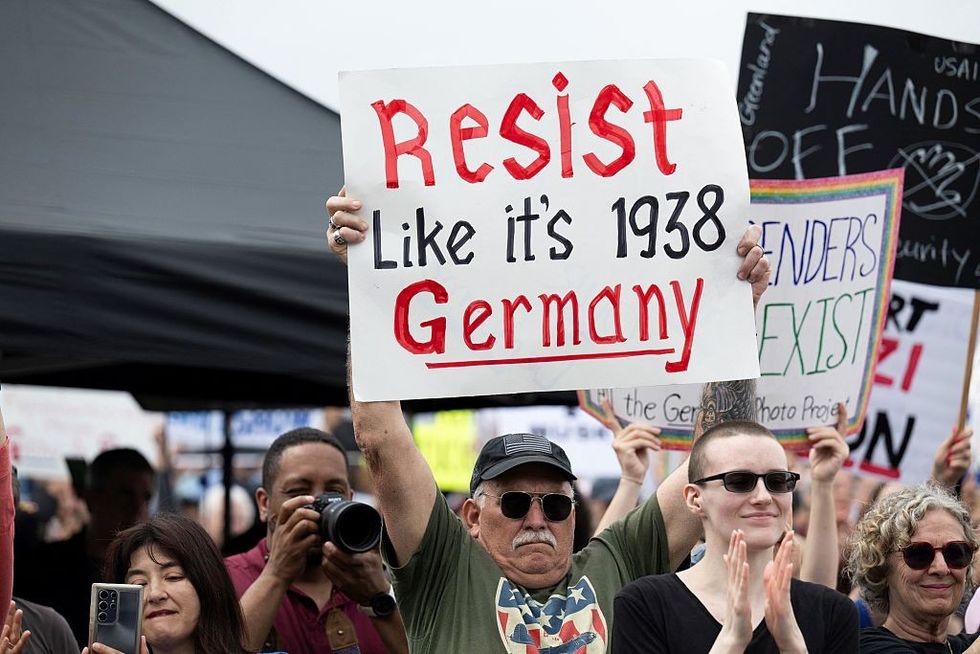
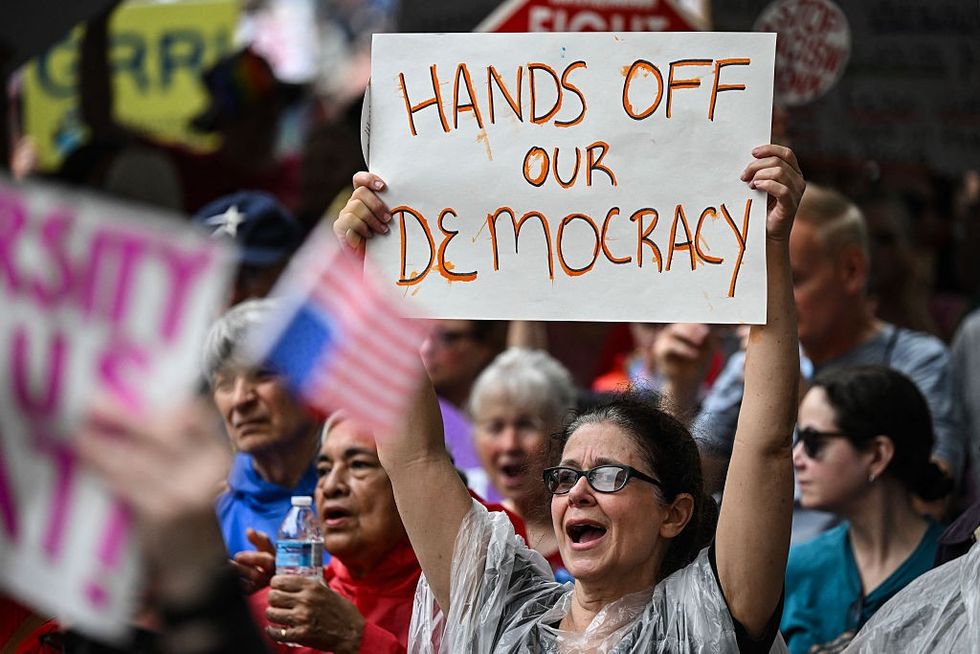
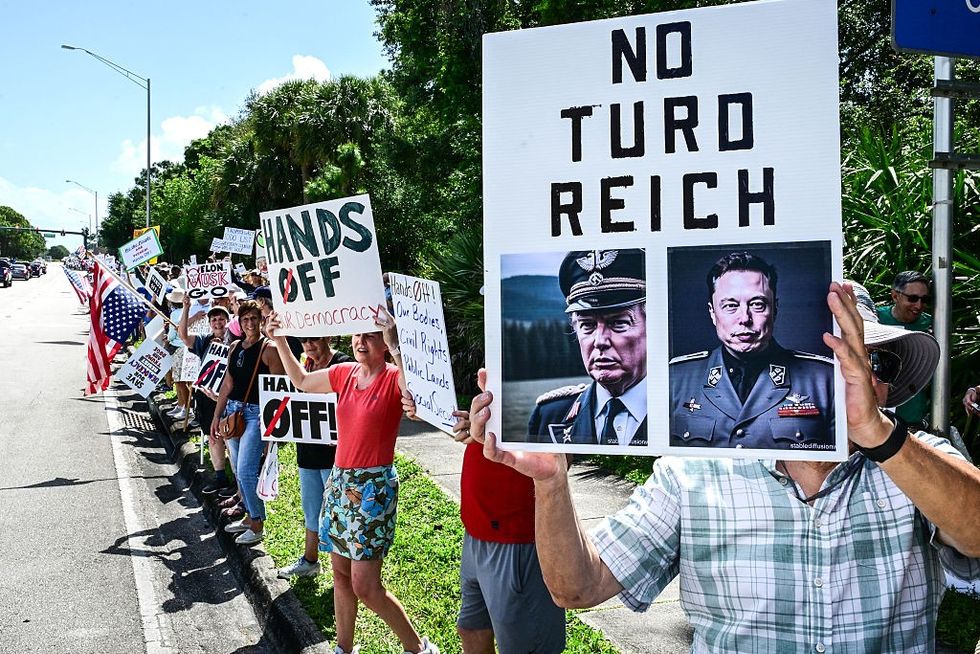
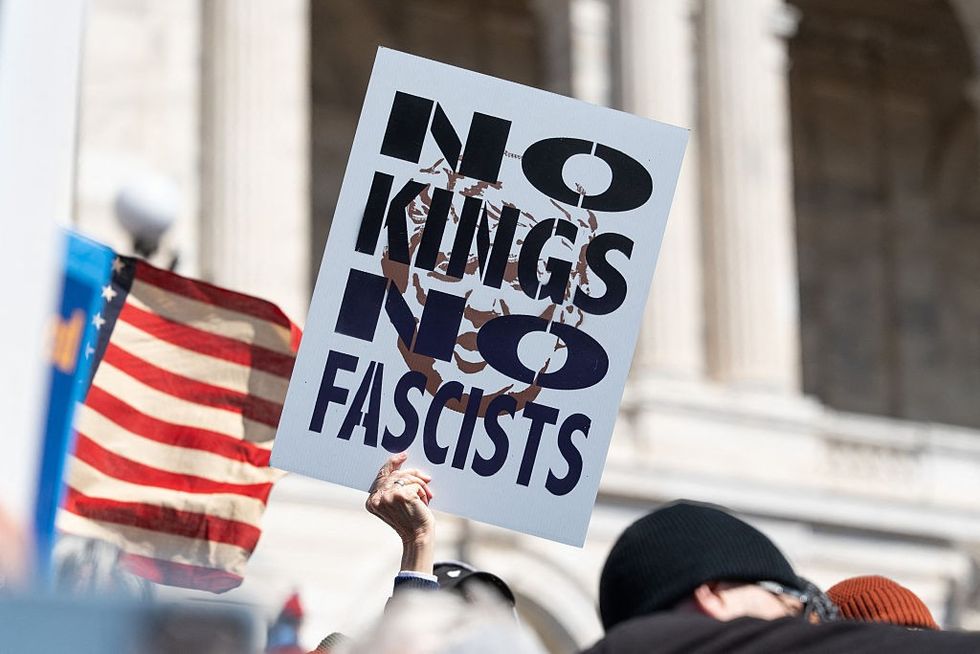
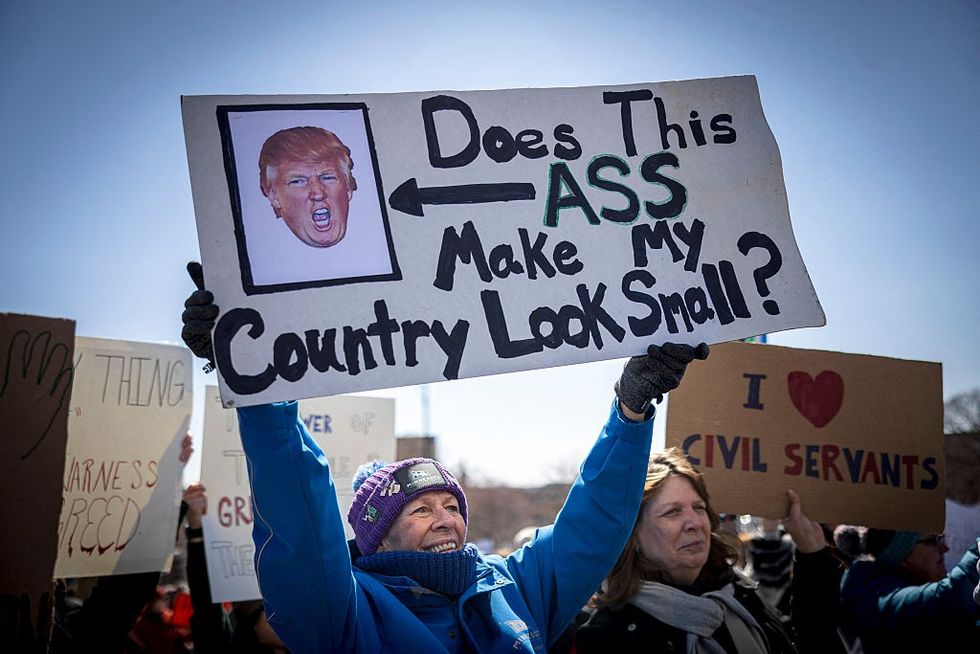
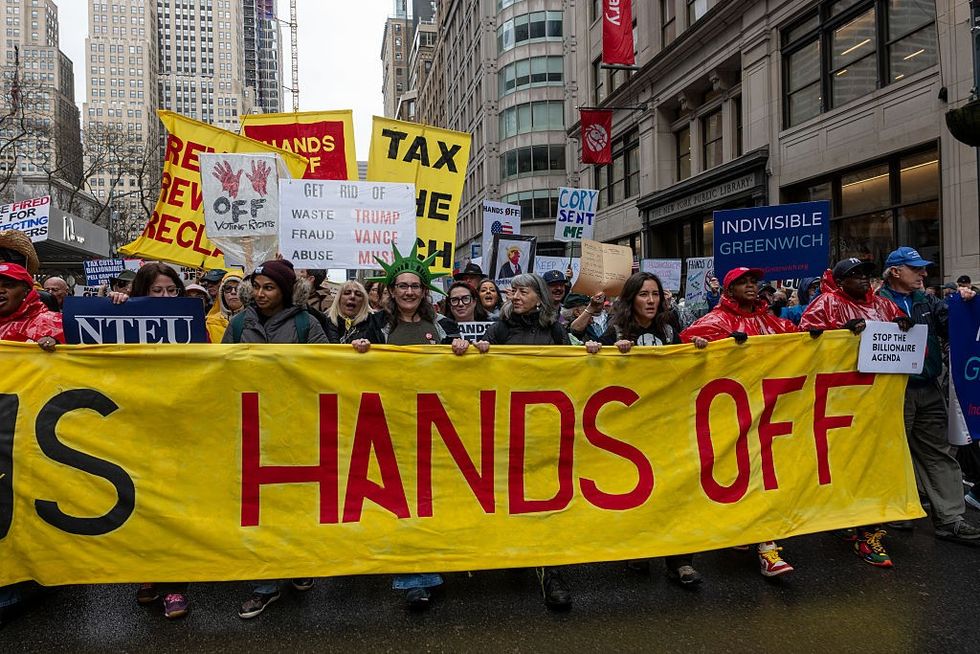
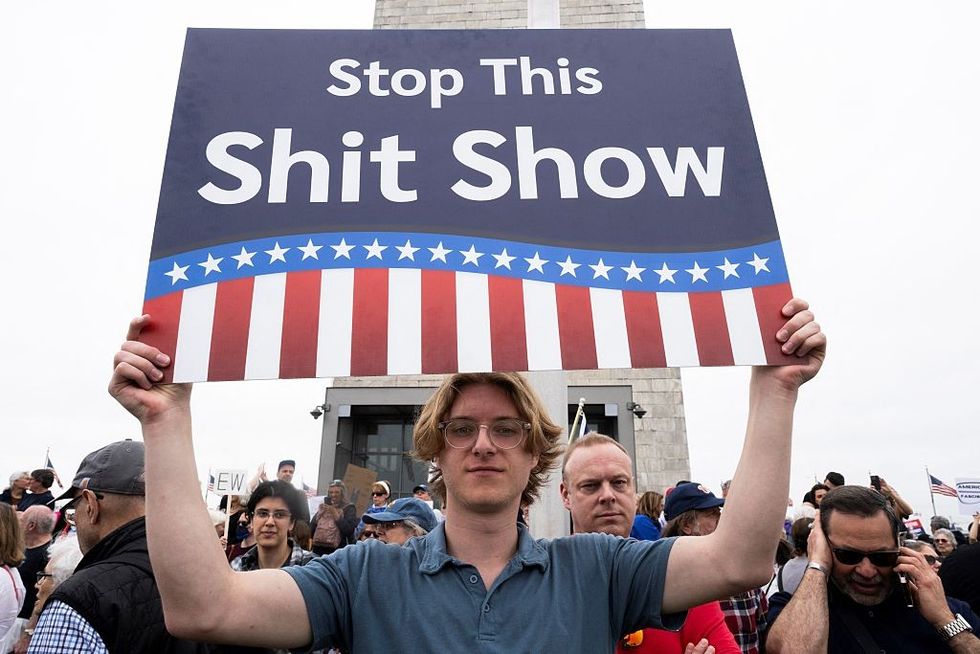
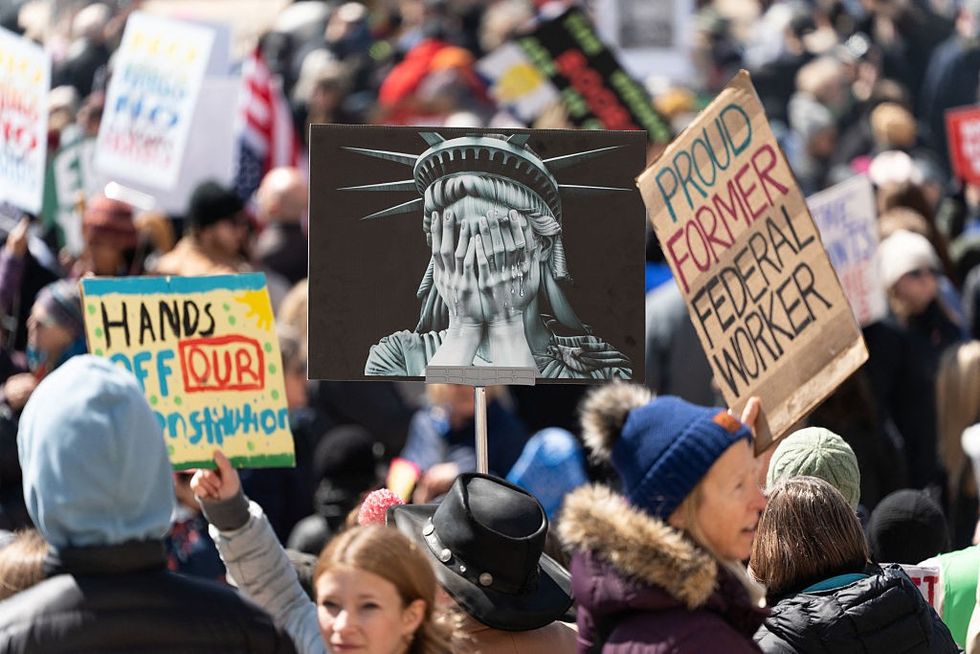
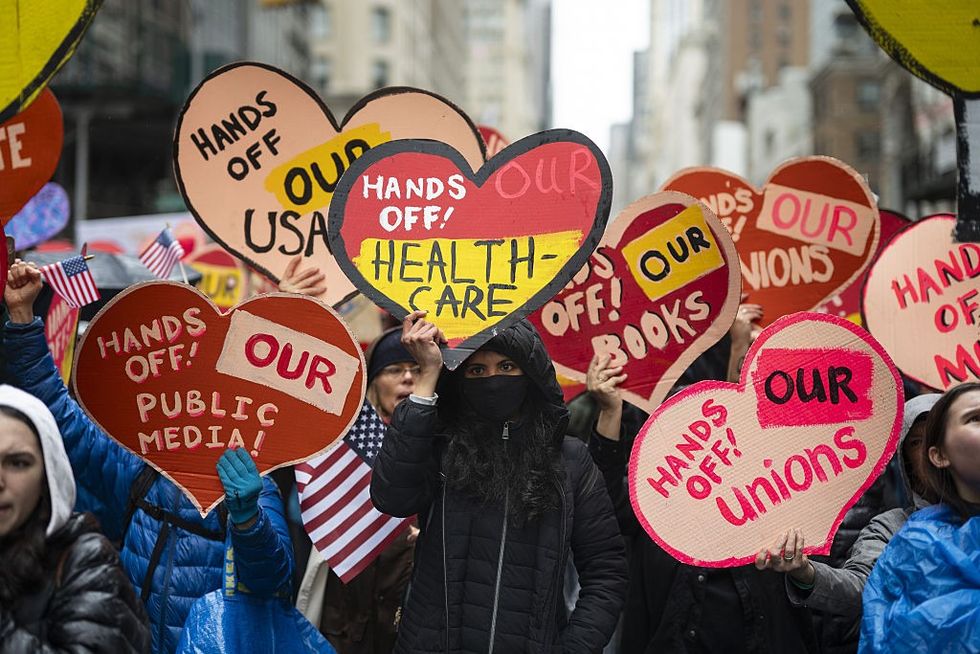
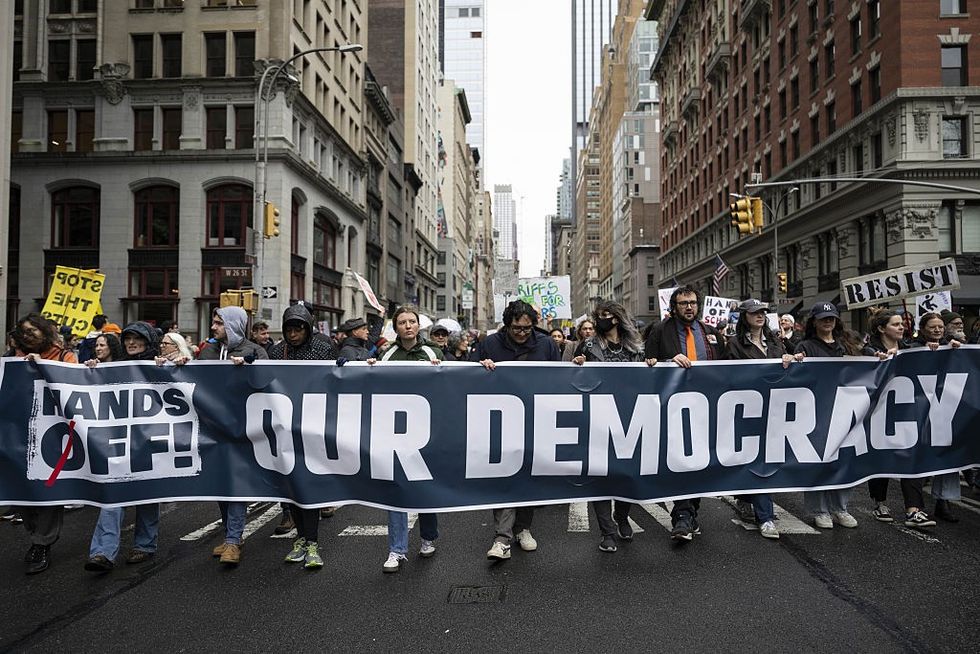
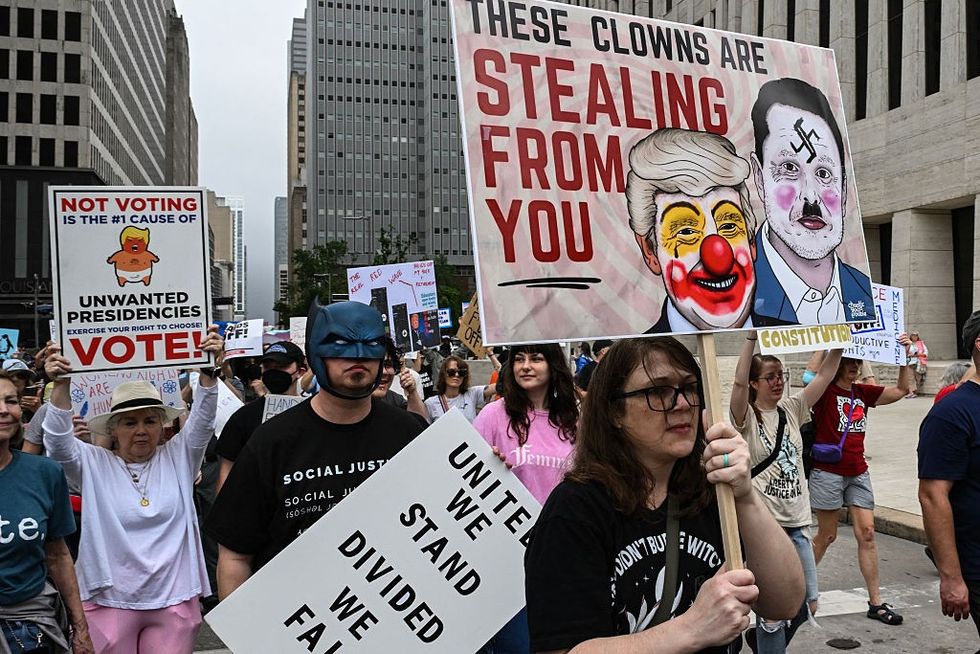
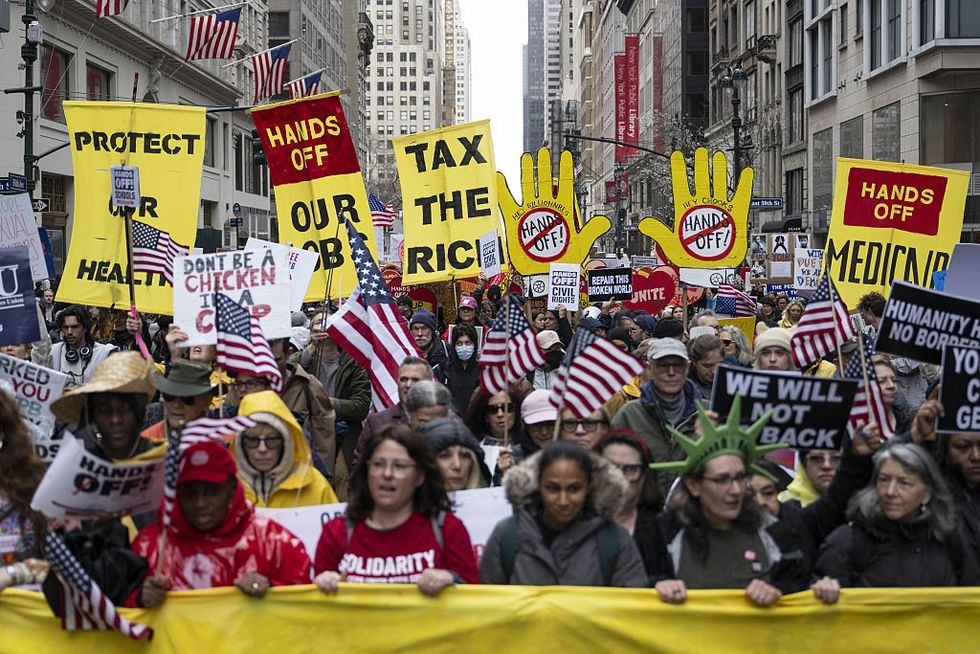
"Everyone involved in this crime against humanity, and everyone who covered it up, would face prosecution in a world that had any shred of dignity left."
A video presented to officials at the United Nations on Friday and first made public Saturday by the New York Times provides more evidence that the recent massacre of Palestinian medics in Gaza did not happen the way Israeli government claimed—the latest in a long line of deception when it comes to violence against civilians that have led to repeated accusations of war crimes.
The video, according to the Palestine Red Crescent Society (PRCS), was found on the phone of a paramedic found in a mass grave with a bullet in his head after being killed, along with seven other medics, by Israeli forces on March 23. The eight medics, buried in the shallow grave with the bodies riddled with bullets, were: Mustafa Khafaja, Ezz El-Din Shaat, Saleh Muammar, Refaat Radwan, Muhammad Bahloul, Ashraf Abu Libda, Muhammad Al-Hila, and Raed Al-Sharif. The video reportedly belonged to Radwan. A ninth medic, identified as Asaad Al-Nasasra, who was at the scene of the massacre, which took place near the southern city of Rafah, is still missing.
The PRCS said it presented the video—which refutes the explanation of the killings offered by Israeli officials—to members of the UN Security Council on Friday.
"They were killed in their uniforms. Driving their clearly marked vehicles. Wearing their gloves. On their way to save lives," Jonathan Whittall, head of the UN's humanitarian affairs office in Palestine, said last week after the bodies were discovered. Some of the victims, according to Gaza officials, were found with handcuffs still on them and appeared to have been shot in the head, execution-style.
The Israeli military initially said its soldiers "did not randomly attack" any ambulances, but rather claimed they fired on "terrorists" who approached them in "suspicious vehicles." Lt. Col. Nadav Shoshani, an IDF spokesperson, said the vehicles that the soldiers opened fire on were driving with their lights off and did not have clearance to be in the area. The video evidence directly contradicts the IDF's version of events.
As the Times reports:
The Times obtained the video from a senior diplomat at the United Nations who asked not to be identified to be able to share sensitive information.
The Times verified the location and timing of the video, which was taken in the southern city of Rafah early on March 23. Filmed from what appears to be the front interior of a moving vehicle, it shows a convoy of ambulances and a fire truck, clearly marked, with headlights and flashing lights turned on, driving south on a road to the north of Rafah in the early morning. The first rays of sun can be seen, and birds are chirping.
In an interview with Drop Site News published Friday, the only known paramedic to survive the attack, Munther Abed, explained that he and his colleagues "were directly and deliberately shot at" by the IDF. "The car is clearly marked with 'Palestinian Red Crescent Society 101.' The car's number was clear and the crews' uniform was clear, so why were we directly shot at? That is the question."
The video's release sparked fresh outrage and demands for accountability on Saturday.
"The IDF denied access to the site for days; they sent in diggers to cover up the massacre and intentionally lied about it," said podcast producer Hamza M. Syed in reaction to the new revelations. "The entire leadership of the Israeli army is implicated in this unconscionable war crime. And they must be prosecuted."
"Everyone involved in this crime against humanity, and everyone who covered it up, would face prosecution in a world that had any shred of dignity left," said journalist Ryan Grim of DropSite News.